Equity Value Formula | Calculator (Excel Template)
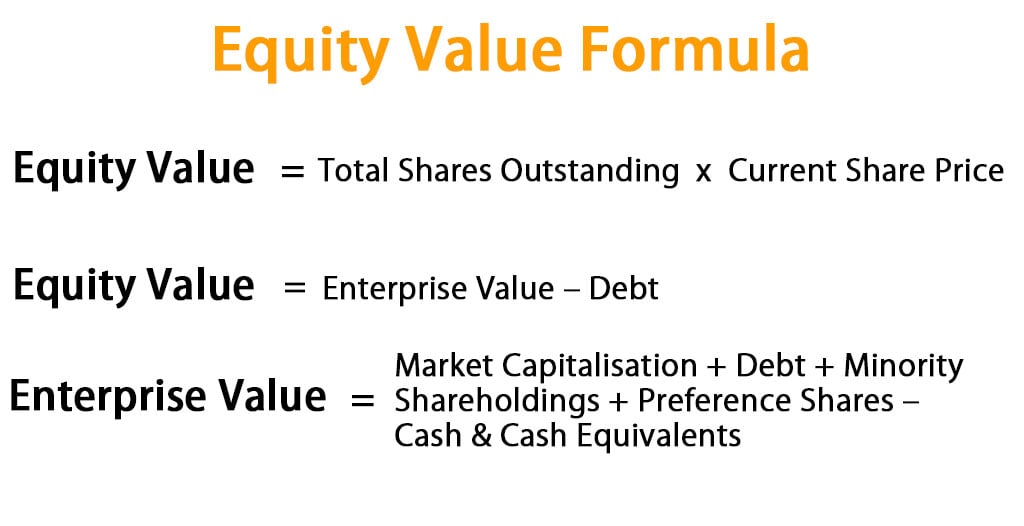
Equity Value Formula (Table of Contents)
Mục Lục
Equity Value Formula
I need to calculate the equity value for a company. Wait, what?
Start Your Free Investment Banking Course
Download Corporate Valuation, Investment Banking, Accounting, CFA Calculator & others
Equity value is simply the value that is attributable to the shareholders of a company for they provided the equity. Equity value is calculated by multiplying the total shares outstanding by the current share price.
Equity Value = Total Shares Outstanding * Current Share Price
OR
Equity Value = Enterprise Value – Debt
The Enterprise value of a company is the total value of the firm that includes other metrics as well such as debt, minority shares, cash & cash equivalents and preference shares.
Enterprise Value = Market Capitalisation + Debt + Minority Shareholdings + Preference Shares – Cash & Cash Equivalents
Examples of Equity Value Formula (With Excel Template)
Let’s take an example to understand the calculation of Equity Value formula in a better manner.
You can download this Equity Value Formula Excel Template here – Equity Value Formula Excel Template
Equity Value Formula – Example #1
Let’s assume there are two companies A and B. We have to find which one out of the two has got a high equity value.

Equity Value is calculated using the formula given below
Equity Value = Total Shares Outstanding * Current Share Price
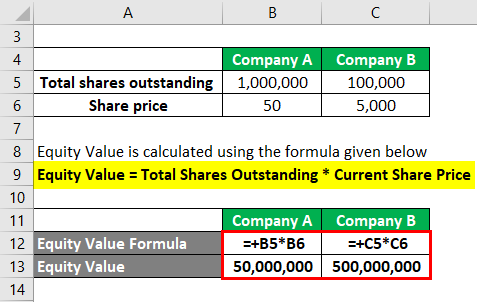
Equity Value of Company A
- Equity Value = +1,000,000 * 50
- Equity Value = 50,000,000
Equity Value of Company B
- Equity Value = +100,000 * 5,000
- Equity Value = 500,000,000
In the above example, we observe that the equity value (calculated by multiplying the shares outstanding by the share price) for company B is higher than company A. Despite the lower number of shares the equity value for company B is higher.
Equity Value Formula – Example #2
Let’s take an example of a Maruti Suzuki company to calculate the equity value.
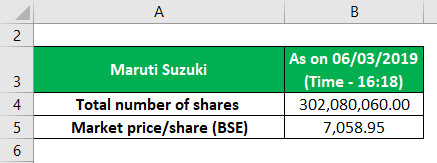
Equity Value is calculated using the formula given below
Equity Value = Total Shares Outstanding * Current Share Price
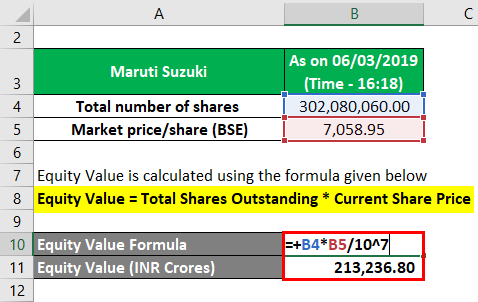
- Equity Value = +302,080,060.00 * 7,058.95 / 10^7
- Equity Value = 213,236.80
As we can see in the above excel snapshot that the market value or the equity value of Maruti Suzuki India is around two lakh crores.
- The share price is the latest price.
- The number of shares denotes the total shares in circulation (outstanding).
Note – The equity value has been converted into crores by dividing with 10^7
Equity Value Formula – Example #3
Let’s take an example of an Eicher motors company to calculate the equity value.
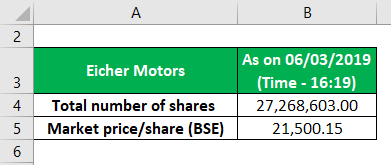
Equity Value is calculated using the formula given below
Equity Value = Total Shares Outstanding * Current Share Price
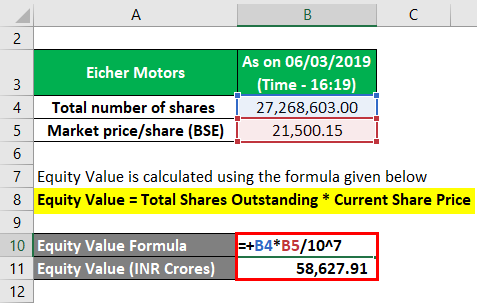
- Equity Value = +27,268,603.00 * 21,500.15 / 10^7
- Equity Value = 58,627.91
As we can see in the above excel snapshot that we can observe that the equity value for this company is around fifty thousand crores.
- The share price is the latest price.
- The number of shares denotes the total shares in circulation (outstanding).
Note – The equity value has been converted into crores by dividing with 10^7
Explanation of Equity Value Formula
For instance, If I were to buy a business and the person on the selling side told me that the business is worth 1 crore INR BUT there is a loan that is yet to be paid that amounts 15 Lakhs INR. Then I would say that I will buy the business only when the debt of 15 Lakhs INR is paid off. This is essentially the equity value. When the component of debt is also taken then we are dealing with the enterprise value or the total value of the firm as opposed to just equity.
The equity value formula is a very important tool for investors as it provides information as to what amount will they get if they had to sell the business. This formula essentially exhibits the market value of the company’s shares. Kindly note that here the value of shares is being calculated and hence the equity part of the company is being valued. If I need to value the whole company, in that case, I will also have to value the debt taken by the company.
If I have to calculate the enterprise value (i.e. the value of equity + debt) then I have to add to the equity value the debt and exclude the cash component.
When using equity value formula we see that the formula is dependent on two parameters, one being the shares outstanding and the other being the share price. You might have observed that there are some companies that have a lower number of shares but have a huge equity value. Companies such as Eicher motors have a very high share value hence the equity value shoots up.
This must be taken as a caveat before investing in companies. Some companies can have a high equity value just for some time (some companies with bad business gain due to a market frenzy) that might not be stable.
The other peculiarity about the equity value formula is that there is no real money involved but it is all about the share price. Many big blue-chip companies have lost literally billions of dollars in equity value due to some temporary bad news. It is all about how the investors perceive the growth of the company and the management drives the company. For instance, the share price of Eicher Motors is a whopping 19000 INR. The fat success of this company has a major contributor behind it and that is the Royal Enfield. People are crazy about that machine and that converts into the huge equity value of the company.
Relevance and Uses of Equity Value Formula
The equity formula is most commonly used in the Price to earnings ratio or the P/E ratio. Although this ratio only gives the value of equity as multiples. The other ratio called the EV/EBITDA ratio gives the firm’s value as opposed to equity value. The price to earnings ratio or the P/E ratio is defined as the price per share divided by the earnings per share.
P/E = Price per Share / Earnings Per Share
This ratio also gives an indication of how expensive or cheap a stock is with respect to the other stocks in the same industry. The P/E ratio should be compared among companies within the same sector.
The equity formula gives us an estimate about the value of a company at a particular point in time. The value at which the equity can be sold off. If the equity formula value keeps on shooting upwards, it means that the investor sentiment towards a particular stock is also strengthening. But some companies with bad businesses also rise because of a market frenzy. But the investors must be careful about such temporary risings.
There’s a saying: “The bigger they are the harder they fall”
This is also true in the case of stocks.
Equity Value Formula Calculator
You can use the following Equity Value Calculator
Total Shares Outstanding
Current Share Price
Equity Value Formula
Equity Value Formula =
Total Shares Outstanding x Current Share Price
=
0
x
0
=
0
Conclusion
The equity value formula yields the value that is a combination of the total shares outstanding and the market price of the share at a particular point in time. It keeps on changing as per the performance of the company and the perception of the investors towards a company. This formula does not include any debt part to it. Hence to calculate the total value of a company we have to include the debt to the equity value and exclude the cash & cash equivalents.
Recommended Articles
This has been a guide to Equity Value formula. Here we discuss how to calculate equity value along with practical examples. We also provide equity value calculator with downloadable excel template. You may also look at the following articles to learn more –
0
Shares
Share















![Toni Kroos là ai? [ sự thật về tiểu sử đầy đủ Toni Kroos ]](https://evbn.org/wp-content/uploads/New-Project-6635-1671934592.jpg)


